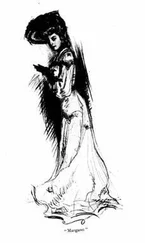James Cabell - The Line of Love. Dizain des Mariages
Здесь есть возможность читать онлайн «James Cabell - The Line of Love. Dizain des Mariages» весь текст электронной книги совершенно бесплатно (целиком полную версию без сокращений). В некоторых случаях можно слушать аудио, скачать через торрент в формате fb2 и присутствует краткое содержание. Жанр: Фэнтези, на английском языке. Описание произведения, (предисловие) а так же отзывы посетителей доступны на портале библиотеки ЛибКат.
- Название:The Line of Love. Dizain des Mariages
- Автор:
- Жанр:
- Год:неизвестен
- ISBN:нет данных
- Рейтинг книги:5 / 5. Голосов: 1
-
Избранное:Добавить в избранное
- Отзывы:
-
Ваша оценка:
- 100
- 1
- 2
- 3
- 4
- 5
The Line of Love. Dizain des Mariages: краткое содержание, описание и аннотация
Предлагаем к чтению аннотацию, описание, краткое содержание или предисловие (зависит от того, что написал сам автор книги «The Line of Love. Dizain des Mariages»). Если вы не нашли необходимую информацию о книге — напишите в комментариях, мы постараемся отыскать её.
The Line of Love. Dizain des Mariages — читать онлайн бесплатно полную книгу (весь текст) целиком
Ниже представлен текст книги, разбитый по страницам. Система сохранения места последней прочитанной страницы, позволяет с удобством читать онлайн бесплатно книгу «The Line of Love. Dizain des Mariages», без необходимости каждый раз заново искать на чём Вы остановились. Поставьте закладку, и сможете в любой момент перейти на страницу, на которой закончили чтение.
Интервал:
Закладка:
Sir John sat meditating for a while; it had grown quite dark in the room as he muttered to himself. He rose now, rather cumbrously and uncertainly, but with a fine rousing snort of indignation.
"Zooks!" he said, "I prate like a death's-head. A thing done hath an end, God have mercy on us all! And I will read no more of the rubbish."
He cast the packet into the heart of the fire; the yellow papers curled at the edges, rustled a little, and blazed; he watched them burn to the last spark.
"A cup of sack to purge the brain!" cried Sir John, and filled one to the brim. "And I will go sup with Doll Tearsheet."
SEPTEMBER 29, 1422
" Anoon her herte hath pitee of his wo, And with that pitee, love com in also; Thus is this quene in pleasaunce and in loye ."
Meanwhile had old Dome Sylvia returned contentedly to the helpmate whom she had accepted under compulsion, and who had made her a fair husband, as husbands go. It is duly recorded, indeed, on their shared tomb, that their forty years of married life were of continuous felicity, and set a pattern to all Norfolk. The more prosaic verbal tradition is that Lady Vernon retained Sir Robert well in hand by pointing out, at judicious intervals, that she had only herself to blame for having married such a selfish person in preference to a hero of the age and an ornament of the loftiest circles.
I find, on consultation of the Allonby records, that Sylvia Vernon died of a quinsy, in 1419, surviving Sir Robert by some three months. She had borne him four sons and four daughters: of these there remained at Winstead in 1422 only Sir Hugh Vernon, the oldest son, knighted by Henry V at Agincourt, where Vernon had fought with distinction; and Adelais Vernon, the youngest daughter, with whom the following has to do.
CHAPTER IV
The Episode Called "Sweet Adelais"
1. Gruntings at Aeaea
It was on a clear September day that the Marquis of Falmouth set out for France. John of Bedford had summoned him posthaste when Henry V was stricken at Senlis with what bid fair to prove a mortal distemper; for the marquis was Bedford's comrade-in-arms, veteran of Shrewsbury, Agincourt and other martial disputations, and the Duke-Regent suspected that, to hold France in case of the King's death, he would presently need all the help he could muster.
"And I, too, look for warm work," the marquis conceded to Mistress Adelais Vernon, at parting. "But, God willing, my sweet, we shall be wed at Christmas for all that. The Channel is not very wide. At a pinch I might swim it, I think, to come to you."
He kissed her and rode away with his men. Adelais stared after them, striving to picture her betrothed rivalling Leander in this fashion, and subsequently laughed. The marquis was a great lord and a brave captain, but long past his first youth; his actions went somewhat too deliberately ever to be roused to the high lunacies of the Sestian amorist. So Adelais laughed, but a moment later, recollecting the man's cold desire of her, his iron fervors, Adelais shuddered.
This was in the court-yard at Winstead. Roger Darke of Yaxham, the girl's cousin, standing beside her, noted the gesture, and snarled.
"Think twice of it, Adelais," said he.
Whereupon Mistress Vernon flushed like a peony. "I honor him," she said, with some irrelevance, "and he loves me."
Roger scoffed. "Love, love! O you piece of ice! You gray-stone saint! What do you know of love?" Master Darke caught both her hands in his. "Now, by Almighty God, our Saviour and Redeemer, Jesus Christ!" he said, between his teeth, his eyes flaming; "I, Roger Darke, have offered you undefiled love and you have mocked at it. Ha, Tears of Mary! how I love you! And you mean to marry this man for his title! Do you not believe that I love you, Adelais?" he whimpered.
Gently she disengaged herself. This was of a pattern with Roger's behavior any time during the past two years. "I suppose you do," Adelais conceded, with the tiniest possible shrug. "Perhaps that is why I find you so insufferable."
Afterward Mistress Vernon turned on her heel and left Master Darke. In his fluent invocation of Mahound and Termagaunt and other overseers of the damned he presently touched upon eloquence.
2. Comes One with Moly
Adelais came into the walled garden of Winstead, aflame now with autumnal scarlet and gold. She seated herself upon a semicircular marble bench, and laughed for no apparent reason, and contentedly waited what Dame Luck might send.
She was a comely maid, past argument or (as her lovers habitually complained) any adequate description. Circe, Colchian Medea, Viviane du Lac, were their favorite analogues; and what old romancers had fabled concerning these ladies they took to be the shadow of which Adelais Vernon was the substance. At times these rhapsodists might have supported their contention with a certain speciousness, such as was apparent to-day, for example, when against the garden's hurly-burly of color, the prodigal blazes of scarlet and saffron and wine-yellow, the girl's green gown glowed like an emerald, and her eyes, too, seemed emeralds, vivid, inscrutable, of a clear verdancy that was quite untinged with either blue or gray. Very black lashes shaded them. The long oval of her face (you might have objected), was of an absolute pallor, rarely quickening to a flush; but her petulant lips burned crimson, and her hair mimicked the dwindling radiance of the autumn sunlight and shamed it. All in all, the aspect of Adelais Vernon was, beyond any questioning, spiced with a sorcerous tang; say, the look of a young witch shrewd at love-potions, but ignorant of their flavor; yet before this the girl's comeliness had stirred men's hearts to madness, and the county boasted of it.
Presently Adelais lifted her small imperious head, and then again she smiled, for out of the depths of the garden, with an embellishment of divers trills and roulades, came a man's voice that carolled blithely.
Sang the voice:
"Had you lived when earth was new
What had bards of old to do
Save to sing in praise of you?
"Had you lived in ancient days,
Adelais, sweet Adelais,
You had all the ancients' praise,—
You whose beauty would have won
Canticles of Solomon,
Had the sage Judean king
Gazed upon this goodliest thing
Earth of Heaven's grace hath got.
"Had you gladdened Greece, were not
All the nymphs of Greece forgot?
"Had you trod Sicilian ways,
Adelais, sweet Adelais,
"You had pilfered all their praise:
Bion and Theocritus
Had transmitted unto us
Honeyed harmonies to tell
Of your beauty's miracle,
Delicate, desirable,
And their singing skill were bent
You-ward tenderly,—content,
While the world slipped by, to gaze
On the grace of you, and praise
Sweet Adelais."
Here the song ended, and a man, wheeling about the hedge, paused to regard her with adoring eyes. Adelais looked up at him, incredibly surprised by his coming.
This was the young Sieur d'Arnaye, Hugh Vernon's prisoner, taken at Agincourt seven years earlier and held since then, by the King's command, without ransom; for it was Henry's policy to release none of the important French prisoners. Even on his death-bed he found time to admonish his brother, John of Bedford, that four of these,—Charles d'Orleans and Jehan de Bourbon and Arthur de Rougemont and Fulke d'Arnaye,—should never be set at liberty. "Lest," as the King said, with a savor of prophecy, "more fire be kindled in one day than all your endeavors can quench in three."
Читать дальшеИнтервал:
Закладка:
Похожие книги на «The Line of Love. Dizain des Mariages»
Представляем Вашему вниманию похожие книги на «The Line of Love. Dizain des Mariages» списком для выбора. Мы отобрали схожую по названию и смыслу литературу в надежде предоставить читателям больше вариантов отыскать новые, интересные, ещё непрочитанные произведения.
Обсуждение, отзывы о книге «The Line of Love. Dizain des Mariages» и просто собственные мнения читателей. Оставьте ваши комментарии, напишите, что Вы думаете о произведении, его смысле или главных героях. Укажите что конкретно понравилось, а что нет, и почему Вы так считаете.





